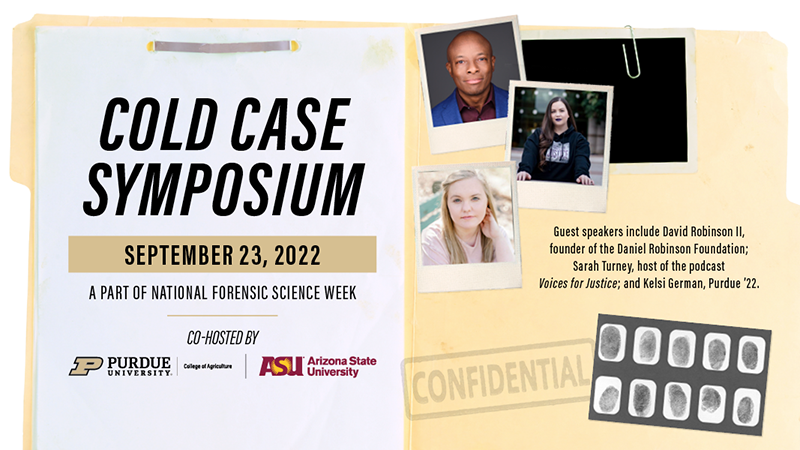Purdue College of Agriculture and Arizona State University to co-host Cold Case Symposium
The Purdue College of Agriculture’s Department of Entomology is partnering with Arizona State University to co-host the inaugural Cold Case Symposium, an in-person and online event that will spotlight America’s cold case crisis. The symposium will take place Sept. 23, during National Forensic Science Week.
Krystal Hans, assistant professor of forensic entomology at Purdue, said the symposium will highlight several disappearances in Arizona. Families will discuss their own loved ones’ disappearance cases, focusing on some of the challenges they faced while trying to move forward in solving the disappearances and offering advice to families in similar situations.
“This year we’ll be focusing on a lot of Arizona cases, particularly ones in the Phoenix area, with the hope that families that are local can attend in person to better network with people who have shared experiences and to understand the resources that are available to them,” Hans said. “We will have counselors on site as well, as we realize the nature of this topic and its accompanying material is triggering. We want to support families and our participants as much as we can.”
David Robinson II, whose son Daniel went missing in Buckeye, Arizona, more than a year ago, will speak about his son’s case, the evidence recovered and his continued search to locate his son. He recently founded the Daniel Robinson Foundation to support families in similar situations.
Sarah Turney, advocate and host of the podcast “Voices for Justice”, will speak about the power of social media and her experience with propelling missing persons cases farther into the spotlight.
Kelsi German, who received a bachelor’s degree in forensic psychology from Purdue in May, will speak about the 2017 unsolved double murder of Abigail Williams and Liberty German, Kelsi’s younger sister, and the experiences and challenges her family faced in their pursuit of justice.
The registration fee for attending virtually is $7, and Purdue students enrolled in the forensic science course can register for free. The in-person attendance fee, which includes lunch and parking at the ASU campus, is $25. The symposium takes place 11:30 a.m. EDT (8:30 a.m. MST) to 5 p.m. EDT (2 p.m. MST). For more information, registration and a full schedule of the Cold Case Symposium, visit https://na.eventscloud.com/coldcase22







